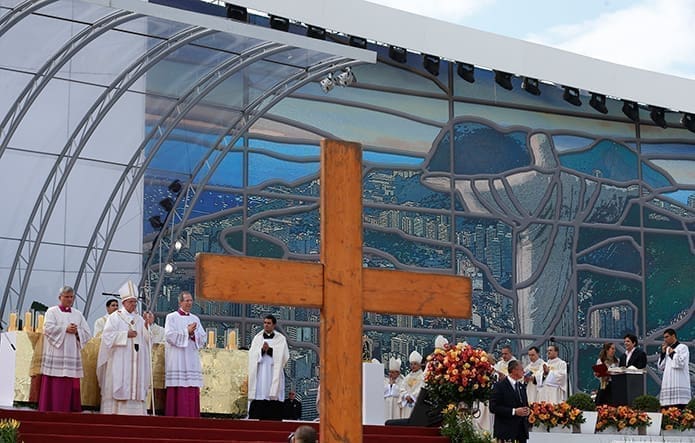 CNS photo/Paul Haring
CNS photo/Paul HaringBrazil
Christ’s cross eases suffering, teaches love, pope tells youths
Published August 1, 2013
RIO DE JANEIRO (CNS)—With his cross and resurrection, Christ promises to walk with and ease the burden of every suffering person, whether that suffering comes from violence, addiction, a broken family, hunger, persecution or the death of a loved one, Pope Francis said.
The traditional Friday mood change of World Youth Day took place July 26 as the pope and more than 1 million young people returned to Copacabana beach to meditate on the Stations of the Cross.
In his reflection, Pope Francis told the young people that in every encounter with Christ’s cross, they can draw strength from him and they can leave the heaviest part of their burden with him.
Through the cross, the pope said, Jesus also unites himself with “those young people who have lost faith in the church, or even in God, because of the counter-witness of Christians and ministers of the Gospel.”
Pope Francis did not get specific about the forms of counter-witness, but his words brought to mind the well-known Via Crucis meditations written in 2005 by then-Cardinal Joseph Ratzinger, only weeks before he became Pope Benedict XVI, in which he denounced “filth” in the church, which was widely interpreted as a reference to clerical sex abuse.
At the same time, Pope Francis also has denounced the counter-witness of clergy and other church personnel who see ministry more as a career or who drive around in fancy cars or exhibit an extravagant lifestyle in other ways.
The 14 traditional Stations of the Cross in Rio were presented by actors and readers on 13 stages along the Copacabana waterfront and on the main stage where Pope Francis sat.
The meditations read during the service also focused on drawing strength from Christ’s cross and healing one’s wounds in the wounds of Christ. Each written from the perspective of a different person in the church—including a missionary, an engaged couple, a pro-life activist, students, those who use social networks—the meditations asked Jesus for the strength to follow and imitate his service to others.
Pope Francis began his reflection recalling the pilgrimage of the World Youth Day cross, which has been carried across oceans, mountains and plains in preparation for each international youth gathering. The cross was carried from station to station along the Avenida Atlantica to the main stage.
“It is, as it were, almost ‘steeped’ in the life experiences of the countless young people who have seen it and carried it,” the pope said. “No one can approach and touch the cross of Jesus without leaving something of himself or herself there, and without bringing something of the cross of Jesus into his or her own life.”
At the center of the Christian faith, he said, is the certainty that “Jesus, with his cross, walks with us and takes upon himself our fears, our problems and our sufferings, even those which are deepest and most painful.”
Pope Francis did not leave his mention of the wounds vague; he said Jesus united himself “to the silence of the victims of violence, those who can no longer cry out, especially the innocent and defenseless,” to families in difficulty, to those addicted to drugs and to “every person who suffers from hunger in a world where tons of food are thrown out each day.”
The suffering Jesus walks with those persecuted for their faith or discriminated against because of the color of their skin, the pope said. And he draws close to “so many young people who have lost faith in political institutions because they see in them only selfishness and corruption.”
Jesus is beside those mourning the more than 200 young Brazilians who died in a fire in a nightclub in Santa Maria in January, the pope said, adding to his prepared remarks.
But it is not only the faults, violence or wrongs committed by others that Jesus takes upon himself, Pope Francis said. “The cross of Christ bears the suffering and the sin of mankind, including our own.”
In taking on people’s burdens, he said, Christ leaves treasure of knowing what great love God has for each person, “a love so great that it enters into our sin and forgives it, enters into our suffering and gives us the strength to bear it.”
Looking out over the crowd lining the beach as far as the eye could see, Pope Francis told the young people that God’s love “is a love in which we can place all our trust, in which we can believe.”
With Christ, he said, “evil, suffering and death do not have the last word because he gives us hope and life: he has transformed the cross from an instrument of hate, defeat and death into a sign of love, victory and life.”
Among the special guest at the Via Crucis were 35 “cartoneros,” or trash pickers, who had come from Argentina hoping to see the Argentine pope. Jesuit Father Federico Lombardi, the Vatican spokesman, said Pope Francis sent someone out to find them and give them seats near him on the stage. The pope greeted them before the prayers began.
Pope Francis encouraged the young people to let themselves be “smitten” by God’s love and allow it to transform the way they see others, so that they would treat everyone—especially the hurting—with mercy and tenderness.”
Drawing a page from classic Ignatian spirituality, Pope Francis told the young people to imagine themselves as one of the characters in the Gospel account of Jesus’ passion and death.
“Be like Simon of Cyrene, who helped Jesus to carry that heavy wood,” he said, or “like Mary and the other women, who were not afraid to accompany Jesus all the way to the end, with love and tenderness.”